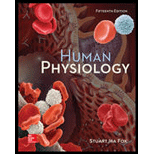
Human Physiology
15th Edition
ISBN: 9781259864629
Author: Fox, Stuart Ira
Publisher: Mcgraw-hill Education,
expand_more
expand_more
format_list_bulleted
Question
Chapter 14, Problem 5bCP
Summary Introduction
To review:
Increased level of retention of salt and water by the kidney due to salt deprivation.
Introduction:
Kidney is a bean shaped organ found in vertebrates. The nephron is the structural and functional unit of the kidney. Each human kidney consists of about 1 million nephrons. They are located on the left and right of the retroperitoneal space.
Expert Solution & Answer
Want to see the full answer?
Check out a sample textbook solution
Students have asked these similar questions
Explain how immersion of the body in water causes an increased volume of urine.
explain the force allowing the kidneys to retain water under more normal conditions versus when someone has drunk seawater.
Explain the relationship between blood uric acid levels and hypertension.
Chapter 14 Solutions
Human Physiology
Ch. 14 - Prob. 1CPCh. 14 - Prob. 2aCPCh. 14 - Describe how the stroke volume is intrinsically...Ch. 14 - Define the terms preload and afterload and explain...Ch. 14 - Prob. 3CPCh. 14 - Prob. 4aCPCh. 14 - Define the term edema and describe four different...Ch. 14 - Prob. 5aCPCh. 14 - Prob. 5bCPCh. 14 - Prob. 5cCP
Ch. 14 - Prob. 6aCPCh. 14 - Prob. 6bCPCh. 14 - Prob. 7aCPCh. 14 - Prob. 7bCPCh. 14 - Define autoregulation and explain how this process...Ch. 14 - Describe blood flow and oxygen delivery to the...Ch. 14 - Prob. 9aCPCh. 14 - Describe the mechanisms that produce vasodilation...Ch. 14 - Prob. 9cCPCh. 14 - Define the term autoregulation and describe how...Ch. 14 - Prob. 10bCPCh. 14 - Prob. 11CPCh. 14 - Prob. 12aCPCh. 14 - Prob. 12bCPCh. 14 - Prob. 13aCPCh. 14 - Prob. 13bCPCh. 14 - Prob. 14CPCh. 14 - Prob. 15aCPCh. 14 - Prob. 15bCPCh. 14 - Prob. 15cCPCh. 14 - Prob. 16CPCh. 14 - Prob. 1RACh. 14 - In the absence of compensations, the stroke volume...Ch. 14 - Prob. 3RACh. 14 - Prob. 4RACh. 14 - Prob. 5RACh. 14 - Prob. 6RACh. 14 - Prob. 7RACh. 14 - The sounds of Korotkoff are produced by...Ch. 14 - Prob. 9RACh. 14 - Blood flow in the coronary circulation...Ch. 14 - Prob. 11RACh. 14 - Prob. 12RACh. 14 - Prob. 13RACh. 14 - Prob. 14RACh. 14 - Prob. 15RACh. 14 - Blood pressure is lowest in
Ch. 14 - Prob. 17RACh. 14 - Prob. 18RACh. 14 - Prob. 19RACh. 14 - The pulse pressure is a measure of
Ch. 14 - Define the terms contractilily, preload, and...Ch. 14 - Prob. 22RACh. 14 - Which part of the cardiovascular system contains...Ch. 14 - Prob. 24RACh. 14 - Prob. 25RACh. 14 - Prob. 26RACh. 14 - Prob. 27RACh. 14 - Prob. 28RACh. 14 - Prob. 29RACh. 14 - Prob. 30RACh. 14 - Prob. 31RACh. 14 - Prob. 32RACh. 14 - Prob. 33RACh. 14 - Prob. 34RACh. 14 - Prob. 35RACh. 14 - Prob. 36RACh. 14 - Prob. 37RACh. 14 - As described in chapter 8, functional magnetic...Ch. 14 - Prob. 39RACh. 14 - Athletes often have a slower resting cardiac rate...Ch. 14 - Prob. 41RACh. 14 - Prob. 42RACh. 14 - Prob. 43RACh. 14 - Prob. 44RACh. 14 - Prob. 45RACh. 14 - Prob. 46RA
Knowledge Booster
Learn more about
Need a deep-dive on the concept behind this application? Look no further. Learn more about this topic, biology and related others by exploring similar questions and additional content below.Similar questions
- Explain how the kidneys help to maintain the balance of acids and bases in extracellular fluid.arrow_forwardA urinalysis reveals that the patients urine contains glucose, hemoglobin, and white blood cells (pus). Are any of these substances abnormal in urine? Explain.arrow_forwardWhy is excretion important in order to achieve osmotic balance?arrow_forward
- Describe the general composition of urine and state the average volume of urine produced by the kidneys each day.arrow_forwardExplain the effect of sympathetic stimulation on the kidneyand the GFR during rest, exercise, and shock.arrow_forwardExplain the change in filtration if excess glucose is presentin the blood entering the kidney.arrow_forward
- Name the hormone that increase reabsorption of water in the kidneys.arrow_forwardExplain why not reabsorbing bicarbonate (HCO3-) and Glucose lead to acidosis and polyuria (respectively).arrow_forwardIdentify the characteristics of a countercurrent mechanism,and explain its role in concentrating the urine.arrow_forward
arrow_back_ios
SEE MORE QUESTIONS
arrow_forward_ios
Recommended textbooks for you
 Human Physiology: From Cells to Systems (MindTap ...BiologyISBN:9781285866932Author:Lauralee SherwoodPublisher:Cengage Learning
Human Physiology: From Cells to Systems (MindTap ...BiologyISBN:9781285866932Author:Lauralee SherwoodPublisher:Cengage Learning Human Biology (MindTap Course List)BiologyISBN:9781305112100Author:Cecie Starr, Beverly McMillanPublisher:Cengage LearningEssentials of Pharmacology for Health ProfessionsNursingISBN:9781305441620Author:WOODROWPublisher:Cengage
Human Biology (MindTap Course List)BiologyISBN:9781305112100Author:Cecie Starr, Beverly McMillanPublisher:Cengage LearningEssentials of Pharmacology for Health ProfessionsNursingISBN:9781305441620Author:WOODROWPublisher:Cengage Concepts of BiologyBiologyISBN:9781938168116Author:Samantha Fowler, Rebecca Roush, James WisePublisher:OpenStax College
Concepts of BiologyBiologyISBN:9781938168116Author:Samantha Fowler, Rebecca Roush, James WisePublisher:OpenStax College


Human Physiology: From Cells to Systems (MindTap ...
Biology
ISBN:9781285866932
Author:Lauralee Sherwood
Publisher:Cengage Learning


Human Biology (MindTap Course List)
Biology
ISBN:9781305112100
Author:Cecie Starr, Beverly McMillan
Publisher:Cengage Learning

Essentials of Pharmacology for Health Professions
Nursing
ISBN:9781305441620
Author:WOODROW
Publisher:Cengage

Concepts of Biology
Biology
ISBN:9781938168116
Author:Samantha Fowler, Rebecca Roush, James Wise
Publisher:OpenStax College
Excretory System; Author: Amoeba Sisters;https://www.youtube.com/watch?v=q5qaGHfdmYM;License: Standard youtube license